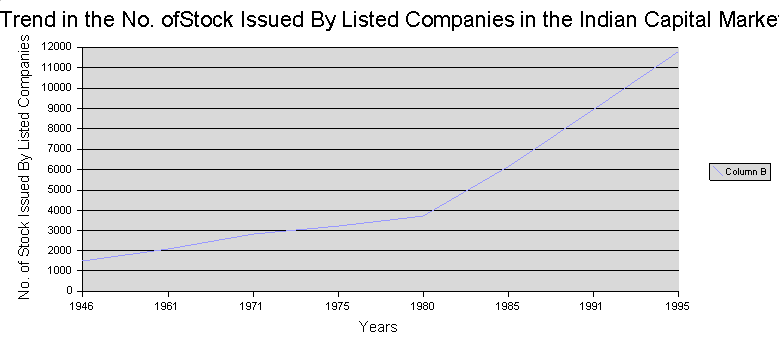Indian Capital Market
Please note that we are not authorised to provide any investment advice. The content on this page is for information purposes only.
The Indian Capital Market is one of the oldest capital markets in Asia which evolved around 200 years ago.
Chronology of the Indian capital markets
1830s: Trading of corporate shares and stocks in Bank and cotton Presses in Bombay.
1850s: Sharp increase in the capital market brokers owing to the rapid development of commercial enterprise.
1860-61: Outbreak of the American Civil War and ‘ Share Mania ‘ in India.
1894: Formation of the Ahmadabad Shares and Stock Brokers Association .
1908: Formation of the Calcutta Stock Exchange Association.
The pattern of growth in the Indian capital markets in the post independence regime can be analyzed from the following graphs.
From the above graph we find that the number of stock exchanges in India increased at a crawling pace till 1980 but witnessed a sharp rise thereafter till 1995.
The following diagram shows the trend in the no. of listed companies participating in the Indian Capital Market . Here again we register a sharp rise after 1980. the number of stocks issued by the listed companies also show a similar trend.

Trading Pattern in the Indian Capital Market
There are mainly two types of transactions that are carried out in the Indian Capital Market, one is the spot delivery transactions and the other is the forward delivery transactions. The role of the broker in the Indian Capital Market is to facilitate the purchase or sale of securities and earn commission on each transaction.
National Stock Exchange
To inject an international standard to the Indian Stock Market the National Stock Exchange was started in 1992 by the Industrial Development Bank of India, Industrial Credit and Investment Corporation of India, Industrial Finance Corporation in India, all Insurance Corporations and the selected commercial banks. The trading members and the participants constitute the players in the national Stock Exchange.
The following are the advantages of the National Stock Exchange over the traditional exchanges:
- The NSE basically integrates the stock market trading network across the nation.
- The investors have the freedom to trade from any part of the nation at the same price.
- Greater operational efficiency and informational efficiency can wipe out the delays in communication, late payments and the malpractices that are common in the traditional trading grounds.
For more details on the Indian Stock Exchange the sites that can be viewed are capitalmarket.com, indiamart.com, yeahindia.com, adb.org, mayin.org etc.






